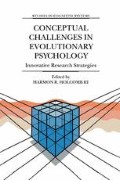Abstract
In this paper we will argue that there are a multiplicity of motives that affect the formation of women’s parenting strategies in an American polygamous community. While biological factors may be compelling, unusual circumstances can modify or supersede parenting propensities. In this setting a woman may work to elicit her husband’s parental contribution less through developing a love bond and more through the achievement of other statuses such as occupation success or dominance over other co-wives. Both of these avenues provide a woman with access to additional resources that she may then extend to her children or keep entirely for herself.
In presenting this argument we will concentrate on the politics of namesaking as a primary means for examining the interplay between parental investment concerns, cultural beliefs, and identity formation in two polygamous communities. The motives behind men’s and women’s namesaking decisions will be examined in order to provide a richer, more complete explanation for competing sex-linked parenting strategies. We will primarily focus on Angel Park, the oldest and largest Mormon Fundamentalist polygamous community in North America. Supplemental data from a Mormon polygamous community in northern Mexico will also be evaluated. The data presented in this chapter were collected between 1994 and 1998, during a four-year study of Angel Park, and in a one-month study conducted in 1995 in the Juarez colony of northern Mexico.
Access this chapter
Tax calculation will be finalised at checkout
Purchases are for personal use only
Preview
Unable to display preview. Download preview PDF.
References
Alford, R. 1988. Naming and Identity: A Cross-Cultural Study of Personal Naming Practices. New Haven: HRAF Press.
Baur, H. 1988. Utopia in the Desert. New York: SUNY.
Bohannan,P. 1985. All The Happy Families. New York: McGrawHill.
Bradley, M. 1993. Kidnapped From That Land. Provo: University of Utah Press.
Cannon, J. 1992. “My Sister, My Wife: An Examination of Sororal Polygyny in a Contemporary Mormon Fundamentalist Sect,” Syzygy, 1,4,315-320.
Chisholm, J.S. 1999. Death, Hope, and Sex. Cambridge: Cambridge University Press.
Clark, A. & Clark, 1.1991. Fathers and Sons in the Book of Mormon. Salt Lake City: Desert Books.
Daly, M. & Wilson, M.I. 1984. “A Sociobiological Analysis of Human Infanticide”, in Hausfater, G. & Hrdy, S., eds., Infanticide. New York: Aldine.
Evans, R.M. 1990. “The Relationship Between Parental Input and Investment”, Animal Behavior, 39,797-798.
Foster, L. 1992. Women, Family and Utopia. Syracuse: Syracuse University Press.
Fortes, M. 1969. Kinship and the Social Order: The Legacy of Lewis Henry Morgan. Chicago: Aldine.
Furstenberg, F.F. & Tralvitie, K.G. 1980. “Children’s Names and Paternal Claims: Bonds Between Unmarried Fathers and Their Children”, Journal of Family Issues, 1, 31 -57.
Gilmore, David. 1982. “Anthropology of the Mediterranean Area”, Annual Review of Anthropology, 11:175-205.
Hrdy, S.B. 1999. Mother Nature. New York: Pantheon Press.
Hrdy, S.B. 1987. “Sex-biased Parental Investment Among Primates and Other Mammals: A Critical Evaluation of the Trivers-Willard Hypothesis”, in Gelles, B. & Lancaster, J., eds., Child Abuse and Neglect: Biosocial Dimensions. New York: Aldine.
Hewlett, B., ed., 1992. Father-child relations. New York: Aldine De Gruyter.
Irons, W. 1988. “Parental Behavior in Humans”, in Betzig, L., Muller, M.B., & Turke, P., eds., Human Reproductive Behavior. Cambridge: Cambridge University Press.
Johnson, J.F., MacAndrew, F., & Harris, P. 1991. “Sociobiology and the Naming of Adopted and Natural Children”, Ethnology and Sociobiology, 12: 365-375.
Low, B. 2000. Why Sex Matters. Princeton: Princeton University Press.
MacAndrew, F. & Jennifer King. 1995, June. “The Naming of Children as a Form of Parental Investment”, paper delivered at the meeting of the Human Behavior and Evolution Society, Santa Barbara, CA.
Musser, J. 1944. Celestial or Plural Marriage. Salt Lake City: Truth Publishing Co.
Parker, S., Smith, J., & Ginat, J. 1973. “Father Absence and Cross-Sex Identity: The Puberty Rites Controversy Revisited”, American Ethnology: 687-706.
Robertson, A.F. 1991. Beyond The Family. Berkeley: University of California Press.
Ross, M. 1994. The Culture of Conflict. New Haven: Yale University Press.
Rossi, A. 1965. “Naming Children in Middle Class Families”, American Sociological Review, 30,499-513.
Sered, S. 1994. Priestess, Mother, Sacred Sister: Religion Dominated by Women. New York: Oxford University Press.
Shipps, J. 1985. Mormonism: The Story of a New Religious Tradition. Urbana: University of Illinois Press.
Smith, D.S. 1977. “Child Naming Patterns and Family Structure Change: Hingham, Massachusetts, 1640-1880”, The Newberry Papers in Family and Community History, Paper No. 76-75.
Smuts, B. & Gubernick, D. 1992. “Male-infant Relationships in Nonhuman Primates: Paternal Investment or Mating Effort?”, in Hewlett, B., ed., Father-child Relations. New York: Aldine De Gruyter, pp. 1 -30.
Trivers, R.L. 1972. “Parental Investment and Sexual Selection”, in Campbell, B., ed., Sexual Selection and the Descent of Man, New York: Springer-Verlag.
Van Wagoner, R. 1986. Mormon Polygamy: A History. Salt Lake City: Signature Books.
Watson, R. 1985. Inequality Among Brothers: Class and Kinship in South China. Cambridge: Cambridge University Press.
Wolf, M. 1972. “Uterine Families and the Women’s Community”, in Wolf, M., ed., Women and the Family in Rural Taiwan. Stanford: Stanford University Press.
Zoellner, T. 1998. “Polygamy on the Dole”, The Salt Lake Tribune, June 28: Al.
Author information
Authors and Affiliations
Editor information
Editors and Affiliations
Rights and permissions
Copyright information
© 2001 Springer Science+Business Media Dordrecht
About this chapter
Cite this chapter
Jankowiak, W., Woodman, C. (2001). Paternal Investment or Maternal Investment? A Critique of the Parental Investment Hypothesis in an American Polygamous Community. In: Holcomb, H.R. (eds) Conceptual Challenges in Evolutionary Psychology. Studies in Cognitive Systems, vol 27. Springer, Dordrecht. https://doi.org/10.1007/978-94-010-0618-7_9
Download citation
DOI: https://doi.org/10.1007/978-94-010-0618-7_9
Publisher Name: Springer, Dordrecht
Print ISBN: 978-94-010-3890-4
Online ISBN: 978-94-010-0618-7
eBook Packages: Springer Book Archive

